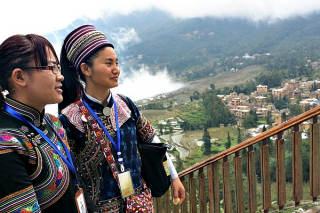Engaging Communities in the Conservation of Nature and Culture – PCA15
Rome and the Bay of Naples, 5-16 October 2015
ICCROM is pleased to announce the commencement of its first course on Promoting People-Centred Approaches: Engaging Communities in the Conservation of Nature and Culture (PCA15).
This short course is aimed at conservation practitioners, providing them with the necessary knowledge and tools to work more effectively with communities through existing management systems. It will also be used as an opportunity to create a forum for participants to share their experiences in both the cultural and natural heritage sectors, learning from each other and other heritage practitioners who are actively involved with communities. This intensive short course will consists of lectures, interactive sessions on sharing experiences and practical exercises based on a real-life case study in the Bay of Naples.
The course will be made up of three classroom-based modules and one cross-cutting module that will encompass case study presentations, visits and activities to explore the challenges and opportunities of people-centred approaches:
MODULE 1: CONSERVATION CONCEPTS: TOWARDS PEOPLE-CENTRED APPROACHES
– exploring the intellectual and professional background to people-centred approaches and why community engagement is important
MODULE 2: BENEFITS OF ENGAGING COMMUNITIES TO SOCIETY AND HERITAGE
– understanding the range of benefits community engagement can bring
MODULE 3: THE PROCESSES OF ENGAGING COMMUNITIES
– examining the concrete ways in which community engagement can be carried out by maintaining continuity and/or exploring new forms of participation
MODULE 4: CASE STUDIES/FIELD ACTIVITIES
– visiting real-life examples of community engagement to assess the successes gained and challenges that need to be addressed. This will take place in the Naples area: Gaiola, Rione Sanità, Pompeii, Vesuvius and Herculaneum
This course is organized in collaboration with the UNESCO World Heritage Centre, the International Union for Conservation of Nature (IUCN), and thanks to a generous contribution by the Norwegian Ministry of Climate and Environment.
Twenty participants representing 19 countries will participate in the course.
There will be about 10 professionals who will bring their experience and skills as resource persons to the course.
Member States represented: Albania, Australia, Belize, People’s Republic of China, Croatia, Gambia, Ghana, Ireland, Jordan, Kenya, Republic of Korea, Lesotho, Nicaragua, Philippines, Poland, Seychelles, Sri Lanka, TFYR of Macedonia, Zimbabwe.

